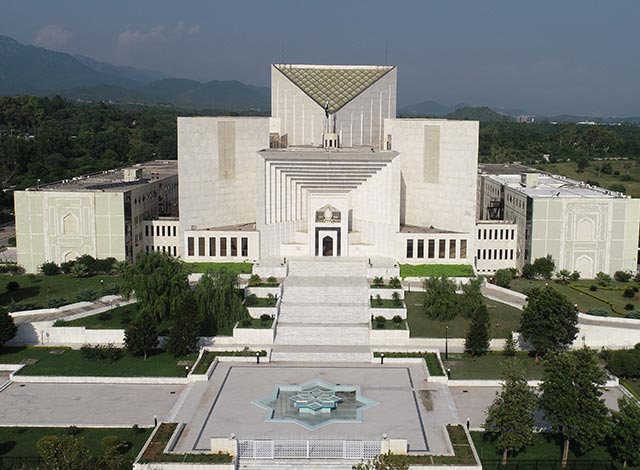Pakistan: government to choose the next chief justice of the Supreme Court
After months of clashes with the judiciary, most notably over the imprisonment of former Prime Minister Imran Khan, the government led by Shehbaz Sharif has approved a constitutional amendment empowering a parliamentary committee with appointing the Chief Justice of the Supreme Court, hitherto chosen based on seniority. For experts, this is a new attempt to limit the powers to which the opposition can turn to.
Islamabad (AsiaNews/Agencies) – The Pakistani government has approved an amendment to the constitution allowing lawmakers to appoint the Chief Justice of the Supreme Court, after the judiciary was accused of favouring former Prime Minister Imran Khan, who has been in prison for over a year.
The constitutional amendment, approved on Monday after months of negotiations, stipulates that the chief justice will be chosen from among the three most senior justices by a special parliamentary committee and will remain in office for a fixed term of three years rather than until retirement at 65.
Established in 1956, the Supreme Court of Pakistan is the highest court in the land, with binding rulings in legal and constitutional matters, but it also has the power to investigate violations of fundamental rights on its own initiative.
Over time, due to repeated military coups and democratic suspensions, the Supreme Court has de facto assumed a role of control over military power. Hitherto, the justices are nominated by the prime minister and confirmed by the president.
The constitutional amendment was approved before the current Chief Justice, Justice Qazi Faez Isa, retires on 25 October.
Under previous rules, he was supposed to be succeeded by the most senior member of the court, namely Justice Mansoor Ali Shah, but in the last two years he has issued a series of rulings considered too favourable to Imran Khan and his party, the Pakistan Tehreek-e Insaf (PTI).
Before becoming Chief Justice of the Supreme Court in 2014, Qazi Faez Isa was the Chief Justice of the Balochistan High Court, conducting a series of judicial inquiries that drew praise and criticism.
Relations between the executive branch and the judiciary soured after last February’s legislative elections in February, in which PTI candidates won.
Imran Khan, who was ousted in a no-confidence vote in April 2022 (for challenging the Pakistani military, according to some observers), was sidelined again, excluded from the government, and jailed on dozens of charges.
Later, the former prime minister and his party were exonerated in several trials. In July, the Supreme Court also ruled that the Election Commission of Pakistan had broken the law by forcing PTI candidates to run as independents.
Subsequently, the court assigned parliamentary seats reserved for women and religious minorities to members of the PTI.
The amendment approved on Monday provides for the creation of commissions of justices within the Supreme Court that will deal exclusively with constitutional disputes, another issue pitting the current government against the PTI forcing them to turn to the Supreme Court.
For Prime Minister Shehbaz Sharif, the constitutional amendment, approved after a parliamentary session that lasted all Sunday night into Monday, sanctioned “the supremacy of Parliament" on a "historic day". In his view, “Today’s amendment, the 26th, is not just an amendment, but an example of national solidarity and consensus.”
His party, the Muslim League, and their long-time rival People's Party, were able to marshal a two-third majority in the National Assembly.
Since Imran Khan's ouster from power, the two political parties have found themselves united against the PTI, whose members have strongly criticised the amendment.
“These amendments are akin to suffocating a free judiciary. They do not represent the people of Pakistan,” said PTI’s Omar Ayub Khan, leader of the opposition in the National Assembly, the lower house of parliament. “A government formed through rigging cannot amend the constitution,” he added.
The speaker of the National Assembly has already set up a 12-member committee to pick Justice Qazi Faez Isa’s successor.
In recent months several judges from Pakistan's local courts have reported intimidation from Pakistan’s intelligence service.
Some international bodies have expressed concerns over Pakistan's increasingly repressive turn. In June, a UN panel of experts called for Imran Khan's release, saying that his detention had "no legal basis".
Despite being in prison for more than a year, the former prime minister remains highly popular and continues to challenge the establishment by asking his supporters, through social media, to stage anti-government protests.
25/11/2022 11:46
29/02/2024 20:15
28/06/2023 19:43







.png)










